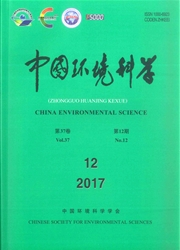

 中文摘要:
中文摘要:
以干旱区绿洲土为供试土壤,用芹菜(Apium graveolens)做指示植物,通过模拟盆栽试验,研究了土壤Cd、Zn、Ni复合污染对芹菜生长及重金属吸收积累的影响。结果表明:(1)低浓度的Cd、Zn、Ni重金属复合处理在一定程度上可促进芹菜根、茎叶的生长,重金属复合作用增强时,即Cd、Zn、Ni浓度增大时,毒害作用逐渐增强,根、茎叶的生长受到明显的抑制。(2)在干旱区绿洲土壤中,芹菜根部和茎叶部对Cd、Zn、Ni的吸收累积量随土壤Cd、Zn、Ni添加量的增大而相应增加。对照处理下,芹菜根部和茎叶部对Cd、Zn、Ni都有一定的吸收,而且芹菜根部和茎叶部对Zn、Ni的吸收要大于Cd。(3)芹菜根部及茎叶部对Cd、Zn、Ni三种元素的富集系数大小顺序同为:Cd〉Zn〉Ni。芹菜对Cd的吸收与迁移能力大于Zn、Ni,Cd更易从土壤系统进入植物系统。芹菜根部对Cd、Zn、Ni三种元素富集能力显著大于茎叶部,三种元素集中在芹菜根部,难以向地上部分转移。
 英文摘要:
英文摘要:
The pot experiments were carried out to investigate the effects of heavy metals(Cd,Zn,and Ni) on the growth and heavy metals accumulation in celery(Apium graveolens) when grown in the arid oasis soil.The results showed that(1) Cd,Zn and Ni complex pollution stimulated growth of root and shoot of celery when in the set range of low concentration,but inhibited when concentration of Cd,Zn and Ni at a high level.(2) In the arid oasis soil,the accumulation of Cd,Zn,Ni by celery increased with the increase of Cd,Zn,Ni concentration in soils.(3) Cd was more mobile than either Zn,or Ni and migrated upwards easily in the arid oasis soil.The transportation sequence of three heavy metals in celery was:Cd〉Zn〉Ni.Cd,Zn and Ni were distributed mainly on the root of celery.
 同期刊论文项目
同期刊论文项目
 同项目期刊论文
同项目期刊论文
 Availability and speciation of Cu, Zn, and Pb added to an irrigated desert soil from the oasis regio
Availability and speciation of Cu, Zn, and Pb added to an irrigated desert soil from the oasis regio Accumulation and bioavailability of copper and nickel in wheat plants grown in contaminated soils fr
Accumulation and bioavailability of copper and nickel in wheat plants grown in contaminated soils fr 期刊信息
期刊信息
